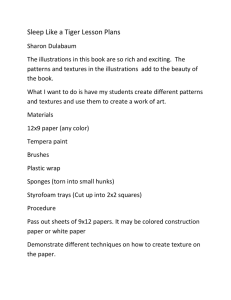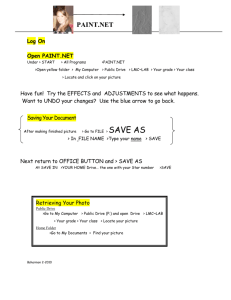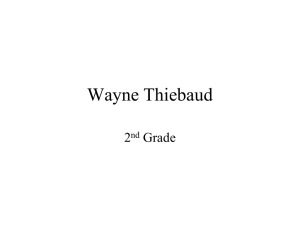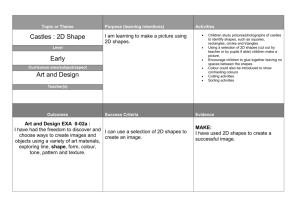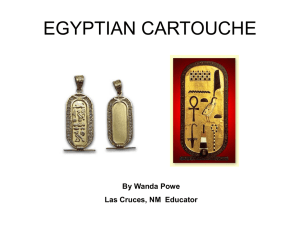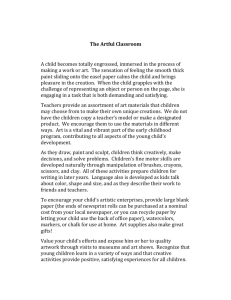Jan. 2013 Sequential Planning... Shape!
advertisement
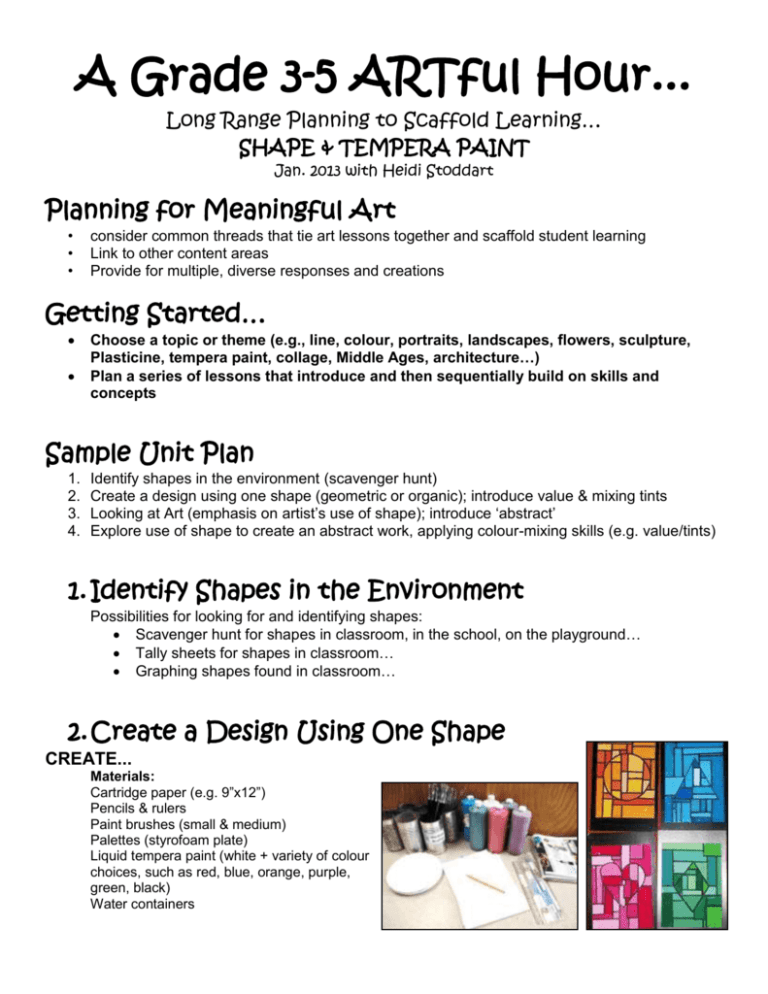
A Grade 3-5 ARTful Hour... Long Range Planning to Scaffold Learning… SHAPE & TEMPERA PAINT Jan. 2013 with Heidi Stoddart Planning for Meaningful Art • • • consider common threads that tie art lessons together and scaffold student learning Link to other content areas Provide for multiple, diverse responses and creations Getting Started… Choose a topic or theme (e.g., line, colour, portraits, landscapes, flowers, sculpture, Plasticine, tempera paint, collage, Middle Ages, architecture…) Plan a series of lessons that introduce and then sequentially build on skills and concepts Sample Unit Plan 1. 2. 3. 4. Identify shapes in the environment (scavenger hunt) Create a design using one shape (geometric or organic); introduce value & mixing tints Looking at Art (emphasis on artist’s use of shape); introduce ‘abstract’ Explore use of shape to create an abstract work, applying colour-mixing skills (e.g. value/tints) 1. Identify Shapes in the Environment Possibilities for looking for and identifying shapes: Scavenger hunt for shapes in classroom, in the school, on the playground… Tally sheets for shapes in classroom… Graphing shapes found in classroom… 2. Create a Design Using One Shape CREATE... Materials: Cartridge paper (e.g. 9”x12”) Pencils & rulers Paint brushes (small & medium) Palettes (styrofoam plate) Liquid tempera paint (white + variety of colour choices, such as red, blue, orange, purple, green, black) Water containers PROCESS… • • • • • • Start with one LARGE SHAPE in the centre of the page Use a pencil and ruler to divide the shape into rectangular shapes Then divide the background into rectangular shapes Choose ONE COLOUR (=MONOCHROMATIC) Fill in all of the shapes in your design using one colour and a variety of its tints, created by mixing with white (TINT = COLOUR + WHITE) Use black paint with a small paint brush to go over the lines dividing each shape 3. Looking at Art (and artist’s use of shape) VISUAL THINKING STRATEGIES… “What is going on in this picture?” “What do you see that makes you say that?” “What more do you see?” Pablo Picasso… • Born in Spain in on Oct. 25, 1881 (died in 1973) • He loved to draw and paint. • His first word was “Piz”, which is Spanish for “Pencil”. • His dad was an art teacher • Lived to be 92 years old & created over 20,000 art objects in his life! • One of the greatest artists of the 20th Century • Cubism (created with Georges Braques from 1907-1014): re-imagined shape and space “The Cubist painters rejected the inherited concept that art should copy nature, or that they should adopt the traditional techniques of perspective… They wanted instead to emphasize the twodimensionality of the canvas. So they reduced and fractured objects into geometric forms, and then realigned these within a shallow…space. They also used multiple or contrasting vantage points.” -Retrieved Jan 2013 from http://www.metmuseum.org/toah/hd/cube/hd_cube.htm Picture Books About Pablo Picasso… By Mike Venezia (Getting to Know the World’s Greatest Artists) By Laurence Anholt By True Kelley (Smart About Art series) By Bob Raczka (features many famous works by various artists) 4. Explore Use of Shape… Abstract Snowman CREATE... Materials: Pencil (name on the back) Cardboard (pizza box lid; 10”x14”) Liquid tempera paint in welled palettes (e.g. blue, red, green, magenta, black) Individual Palettes with white paint (styrofoam plate) Paint brush (small) Water container Newspaper (to protect desks) PROCESS… Consider possible components of a snowman (e.g., circles, hat, scarf, buttons, arms, facial features…) ‘Draw’ with paint brush and black paint… o Start with a vertical line down the middle of the cardboard/page o Arrange asymmetrical shapes and ‘fractured’ or ‘misplaced’ components to create the idea of a snowman rather than a realistic representation of one o Consider the background… dividing the background into shapes or sections Value & Colour Mixing… use a variety of colours and values to paint the shapes and spaces in your abstract work Use black paint and a smaller brush to add details (or to reapply black lines) Artworks by Gr. 2’s at FES
![[Agency] recognizes the hazards of lead](http://s3.studylib.net/store/data/007301017_1-adfa0391c2b089b3fd379ee34c4ce940-300x300.png)
